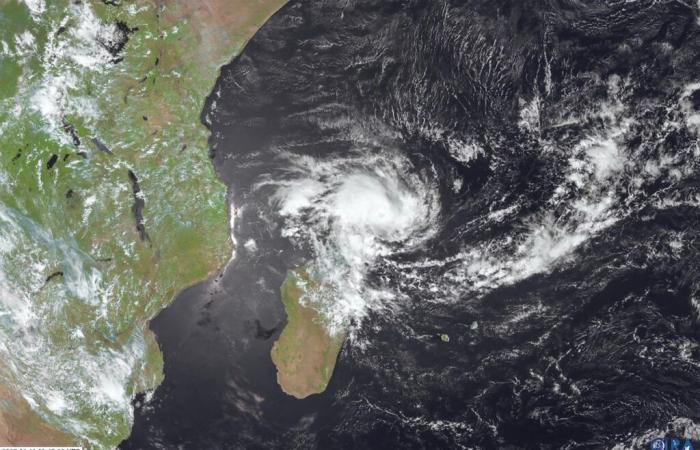
France –
Mayotte placed on red cyclone alert
Not yet recovered from Cyclone Chido, Mayotte was placed on red cyclone alert on Saturday.
AFP
Posted today at 4:08 a.m. Updated 9 minutes ago
Satellite image of the storm Cyclone Dikeledi approaching Mayotte, between Madagascar and Mozambique, taken on January 11, 2025 by the European Space Agency and Colorado State University-CIRA (CSU/CIRA).
AFP PHOTO / European Space Agency (ESA) and the Colorado State University-CIRA (CSU/CIRA)
Subscribe now and enjoy the audio playback feature.
BotTalk
Less than a month after the devastating passage of Cyclone Chido on Mayotte, the archipelago has once again been placed on red cyclone alert on Saturday since 10 p.m. local time (8 p.m. in Switzerland), awaiting passage off its coast. southern coasts of Dikeledi, forecast to be very rainy.
“The population must be confined in a solid dwelling, with a stock of water and food available to survive the cyclone,” requested the prefecture of Mayotte.
“I think this time people have understood that it’s serious” and “that we have to take shelter,” said the first deputy mayor of Mamoudzou, Dhinouraine Mcolo, on the Mayotte-La 1ère channel. Mainty. “All movement outside the confinement areas” is “prohibited”, except for emergency services and authorized persons, until further notice.
“A dangerous sea”
Cyclone Dikeledi was located at 1:00 a.m. local time on Sunday (11:00 p.m. Saturday in Paris) 380 km east of Mayotte, an overseas department of 320,000 inhabitants.
After reaching the northeast coast of Madagascar on Saturday around 4:30 p.m. GMT (5:30 p.m. in Paris), the cyclone began to weaken and was downgraded to the stage of a strong tropical storm, according to Météo-France. But Dikeledi should gradually regain strength when he leaves the land.
“The province of Antsiranana in Madagascar is currently experiencing the most intense conditions of the evening with still destructive winds for the next few hours, heavy rain (extending to the north of the province of Toamasina) and dangerous seas” , specified Météo-France in its 11:00 p.m. bulletin.
Some 645 pre-positioned Civil Security personnel
After passing through the Mozambique Channel, Dikeledi is expected to pass around 100 km south of Mayotte on Sunday, before being classified as a tropical cyclone again on Monday during the day.
The overseas territory was placed on orange alert at the start of the morning. Barge traffic (local ferries) has been stopped and the international airport has closed its doors until further notice.
Some 645 Civil Security personnel have been pre-positioned in strategic locations in the archipelago to intervene as quickly as possible following the cyclone alert. “Nothing is left to chance,” Manuel Valls, Minister of Overseas Territories, assured AFP in the middle of the day.
79 places ready to serve as shelter
In total, “more than 4,000 personnel are mobilized, including 1,500 to reinforce civil security, the police, the gendarmerie and the army,” according to the Ministry of the Interior.
Messages in French, Shimaoré and Kibushi (regional languages) were broadcast on radio and television to alert the population. “The religious relay was used with Friday prayers,” as well as social networks, notably Facebook, also indicated Manuel Valls.
In total, 79 places are ready to welcome people in need of shelter, the prefecture identified.
“It’s a real danger!”
Images broadcast in Mayotte-La 1ère showed motorists filling up with fuel at service stations or families refueling in stores to buy packs of water in particular.
In the Mahoran capital, Camelia Petre, 35, indicated in the morning that she was going to accommodate “friends and colleagues” who “lost their homes” during Cyclone Chido.
She is also “concerned for the precarious population”. “The makeshift habitats have been rebuilt, but in an even more fragile way, so the wind, which risks […] transforming (the materials) into projectiles, and the rain and mud that will flow away, it’s a real danger!”, worries this urban planning professional.
Possible mudslides
In its latest bulletin, Météo-France predicts “a significant rainy and windy deterioration” which could generate “flash floods, floods and landslides”.
“Gusts of up to 80 to 90 km/h, or locally 100-110 km/h, are likely, particularly on the southern part of the island,” warns Météo-France.
Possible mudslides constitute “significant risks”, underlined the prefect. “Chido was a dry cyclone, we had very little rain. This tropical storm is a wet event, we’re going to have a lot of rain […] on already weakened ground.” Chido caused colossal damage in the 101st department, the poorest in France, leaving at least 39 dead and more than 5,600 injured.
Cyclones usually develop in the Indian Ocean from November to March, but this year surface waters are close to 30°C in the area, providing more energy for storms, a global warming phenomenon also observed this fall in the North Atlantic and the Pacific.
“Latest news”
Want to stay on top of the news? “Tribune de Genève” offers you two meetings per day, directly in your email box. So you don’t miss anything that’s happening in your canton, in Switzerland or around the world.
Other newsletters
Log in
Did you find an error? Please report it to us.
0 comments





